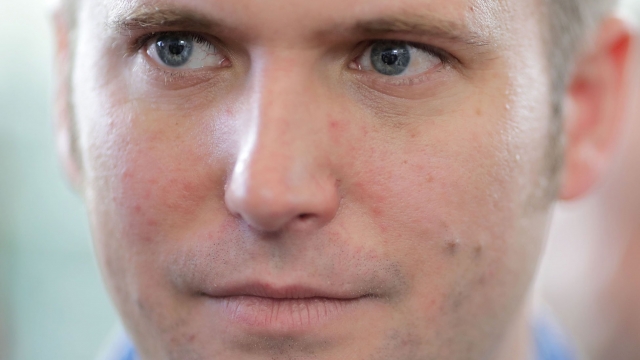
How Richard Spencer rose from obscurity to become America’s most infamous white nationalist
http://ift.tt/2gPZSlY
Spencer started out by crafting his far-right ideology in liberal spaces.
He founded the alt-right movement and used the National Policy Institute to push his ideas into the mainstream.
He was among the organizers of the Charlottesville, Virginia rally in August that led to the death of a counterprotestor.
Florida Gov. Rick Scott declared a state of emergency in Alachua County on Tuesday three days before a scheduled speech by white nationalist leader Richard Spencer at the University of Florida, which is located in the county’s capital of Gainesville.
While the University of Florida initially rejected Spencer’s request to speak on campus due to security concerns, according to the university’s website, it is required to host the event on Thursday because public universities are forbidden from limiting speech.
Spencer’s previous speaking events have attracted hundreds of counterprotestors which have at times led to their cancellation. However Spencer has only found national notoriety of this sort in the last two years, and it started from humble suburban beginnings.
Spencer traces his roots to traditionally liberal settings
Spencer grew up in the suburbs of Dallas, and attended an all-male prep school where he was described as unremarkable. Nevertheless, he went on to graduate and attend Colgate University, only to then transfer to the University of Virginia (UVA) where he acquired an interest in the composer Richard Wagner and philosopher Freidrich Nietzsche, both of whom influenced Nazi thought in Germany.
Spencer later credited Nietzsche with inspiring him to pursue his far-right political agenda. Much later, Spencer helped organized the rally in Charlottesville, Virginia — the home of UVA — where a counterprotestor was killed in August.
After finishing at UVA, Spencer was admitted into a master’s program in the humanities at the University of Chicago in 2002, where he mingled with other students in his program including "Jews and Muslims, Africans and African-Americans, gay men and women," according to the Point Magazine. He also regularly played basketball with a black woman. Having grown up in diverse environments, Spencer said he was "comfortable with people who are left-wing," and described "learning the art of lying" at the University of Chicago, allowing him to conceal his controversial views.
Spencer made a name for himself in conservative media and at a Washington think tank
After dropping out of a PhD program at Duke University to, in his own words "pursue a life of thought-crime," Spencer worked as an editor at a variety of right-leaning publications including Taki’s Magazine, American Conservative, and the National Review, and was fired from the latter two for his extreme and racist views.
In 2010 he founded the publication AlternativeRight.com, coining a term that later became shortened to "alt-right." His website became the first focal point for the alt-right movement, which later came to include people like activist Mike Cernovich and provocateur Milo Yiannopoulos. Brietbart News chief and former White House chief strategist Steve Bannon gave the movement a platform through the right-wing website. Although Breitbart’s staff have recently begun distancing themselves from Spencer’s movement, Bannon himself proclaimed Breitbart to be the "platform for the alt-right" in July of 2016.
In 2011, Spencer took over the operations of the Washington, DC-based think tank the National Policy Institute and become its president. He fashioned the think tank into a vehicle for his white nationalist ideology, and although NPI has a very small staff and funding stream, Spencer managed to hold several conferences before the 2016 presidential election.
On one occasion in 2014, however, hoping to find fertile ground for his movement by holding a conference in Hungary, Spencer was arrested and deported by the Hungarian government. He was subsequently banned for three years from the whole of the European Union.
Donald Trump’s campaign and election rocketed Spencer into the national spotlight
David J. Phillip/APAs Donald Trump quickly became the frontrunner for the Republican presidential nomination in 2016, Spencer and Bannon began to voice their support for him. Spencer later credited Trump with invigorating his nationalist movement and identified Trump as having views that dovetailed with those of the alt-right. Spencer has repeatedly noted that Trump never distanced himself from his alt-right movement.
The watershed moment for Spencer and his National Policy Institute came just after the 2016 election that elevated Trump to the presidency — in a video from The Atlantic that was viewed by millions of people, Spencer was seen delivering a speech at an NPI conference in Washington, DC where he used Nazi salutes, imagery, and phrases to celebrate Trump’s victory as a victory for his cause.
Since then, Spencer has made a name for himself speaking provocatively to mainstream news outlets and on college campuses. In January 2017, during protests in Washington during Trump’s inauguration, Spencer was recorded getting punched in the face by a masked protestor. The video went viral shortly afterward and further elevated his presence in mainstream media. He was one of the organizers of the "Unite the Right" Charlottesville rally in August, and was also present at a second rally in the city earlier this month.
Spencer continues to appear in media and has vowed to continue advancing his alt-right agenda.
NOW WATCH: A North Korean defector trekked 6,000 miles on crutches to flee — now he helps others escape
See Also:
- An entire German soccer team took a knee before a game, echoing the NFL anthem protests
- This missile testing site in North Korea doubles as a beachside resort
- America might be losing its place on the world stage — and diplomats worry that ‘things will start to fall apart’
SEE ALSO: White nationalists carrying torches returned to Charlottesville chanting ‘we will be back’
business
via Business Insider http://ift.tt/eKERsB
